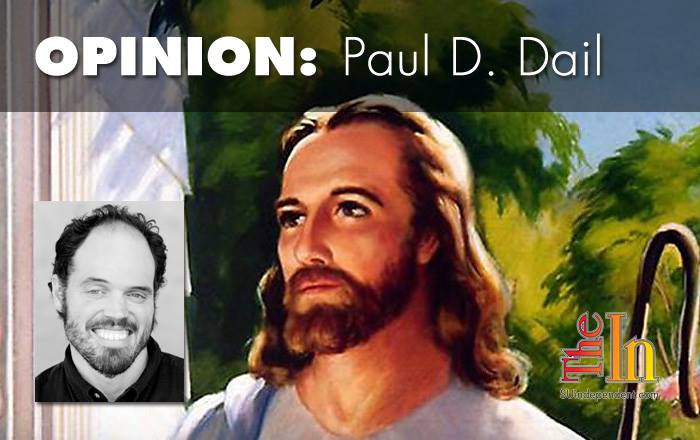
Written by Paul Dail
Here’s the good news. As of a recent change in the beard policy at Brigham Young University, Jesus would not get kicked out for sporting his well-known look. But he would have to jump through some hoops to stay there.
Per the BYU Honor Code (and yes, I recognize that to some extent they’re a private school, therefore able to do whatever they want, my opinion be damned), male students are now allowed to have a beard—officially changing a policy which has been in effect for at least forty years—on three conditions: they are in a theatrical production, they have a medical condition, or the beard is part of their religious practice or observance.
If Jesus wanted to keep his beard, he would have to go through an application process for a beard card. According to an article in the Salt Lake Tribune, one student who applied as part of a theatrical production was told he had to wear a special designation lanyard and a shirt and tie—a combination not required of any other students—to “compensate” for the beard.
While I’m a far cry from the purported Son of God, I am also a bearded man (my bio picture isn’t exactly the most recent or representative of my current appearance, especially now that I’m working freelance and don’t have to go out into public that much). And as a bearded man, I’m going to say it’s time for BYU to eliminate the beard policy entirely. It’s time for the persecution to end.
The beard as a symbol of God and Country
It’s not easy having a beard. It’s a grooming commitment. Not only that, there is a certain stigma attached to facial hair in our society. In the introduction to his book, “The Year of Living Biblically: One Man’s Humble Quest to Follow the Bible as Literally as Possible,” author A.J. Jacobs describes the trials of a bearded man pretty well.
“As I write this, I have a beard that makes me resemble Moses. Or Abe Lincoln. Or Ted Kaczynski. I’ve been called all three … I’ve battled itch and heat. I’ve spent a week’s salary on balms, powders, ointments and conditioners. My beard has been a temporary home to cappuccino foam and lentil soup. And it’s upset people. Thus far, two little girls have burst into tears and one boy has hidden behind his mother.”
Jacobs talks about the unspoken brotherhood of bearded men (yes, it does exist) and then explains how we kind of need that brotherhood because of the stigma that many other people put on bearded men. Baseball seems to be helping the problem (well, maybe) and the BYU beard policy change is a step in the right direction, but people still regard you with suspicion if you have a less-than-perfectly trimmed beard.
But why is that? There has been a great tradition of revered men reaching back through history who sported a beard. In the United States, obviously Abraham Lincoln is most notable, but there are at least eight other presidents who chose not to go completely clean shaven.
And have you seen some of the pictures of Chester A. Arthur? Go ahead, look it up. I’ll wait…
However, perhaps more important than a grooming choice of statesmen is the view religion takes in regards to beards. The line in the BYU Honor Code prohibiting beards was not handed down by one of the prophets. It was decided by a BYU president.
In fact, if we are to practice the teachings of the Bible to the letter as Jacobs did for a year, we would be reminded of Numbers 6:5: “a razor shall not come upon his head, until the days be fulfilled which he vowed to the Lord: he shall be holy, cherishing the long hair of the head all the days of his vow to the Lord.”
Or Leviticus 19:27: “Ye shall not round the corners of your heads, neither shalt thou mar the corners of thy beard.”
Several Christian groups still hold to these ideals. For example, the constitution of the Franciscans (yeah, I didn’t know they had one either) equates the beard with manliness. “The Friars shall wear the beard, after the example of Christ most holy,” it reads, “since it is something manly, natural, severe, despised and austere.”
Similar ideals exist among clergy members of the Eastern Orthodox Church and members of the Anabaptist faiths (Amish, Hutterites, and Mennonites).
Outside of Christianity, we find Jesus (well, kind of) and his potential exemption at BYU. The Jewish faith has a variety of stances, from the ultra-Orthodox not shaving at all to reform Jews who stake no claim on the need or lack thereof for facial hair.
While not specified by the Quran, practitioners of the Muslim faith who choose to follow the teachings of the Prophet Muhammad must keep a beard. Same for the Sikh religion.
Damn dirty hippies
A little closer to home, certainly members of the LDS faith have seen pictures of a bearded Brigham Young. And in the early 1900s, LDS missionaries in England were required to grow beards as a sign of maturity and dignity. However, even if you’re not Franciscan, Eastern Orthodox, or Amish, if you’re Christian, you probably have a picture in your mind of Jesus. Beard and all. While we’re at it, take a peek at God on the ceiling of the Sistine Chapel. Who are we to criticize the choice of facial hair by the Father and the Son and deem it now unacceptable?
I blame the hippies.
Most articles on this issue cite the fact that the anti-beard policy at BYU (or at least emphasis on the policy) came about during the late-60s/early-70s as a way to distinguish their students from those long haired, bearded hippies seen protesting across the country.
Again, I have to go back to Jesus, one of the biggest human rights activists/rabble rousers of our time. I’m pretty sure that had the Second Coming occurred in the late-60s, Jesus would’ve probably been out there holding a sign and looking like one of the people that BYU president Dallin Oaks said in 1971 the university was trying to distinguish their students from.
Oaks linked beards to, “protest, revolution and rebellion against authority.” Hmm. Sound like anyone we know?
I know much of this has been tongue-in-cheek (and probably a little blasphemous to some of you), but the somewhat serious point is this: negative stereotypes—especially when it comes to appearance choices and the changing world—are often reinforced and carried on without any thought to why. I saw an interesting meme floating around Facebook that said, “Sometimes the nicest people you meet are covered in tattoos, and sometimes the most judgmental people you meet go to church on Sundays.”
College provides one of the best (and often last) opportunities for people to explore different sides of their personality in the journey to discover who they are. Why stifle that creativity? Like many rules and attitudes which outlive their original intent, the BYU beard ban and subsequent public perceptions of facial hair are obsolete.
What would Jesus do? Well, he might not go to BYU.
Paul D. Dail received his BFA in English with a Creative Writing emphasis from the University of Montana, Missoula. In addition to freelance journalism and web content creation, he also enjoys writing creative nonfiction and fiction (with a penchant for the darker side of the page). His collection of flash fiction, “Free Five,” has spent over a year and a half in the top 50 Kindle Horror Shorts Stories since its publication in 2012. Currently he lives on the outskirts of Kanarraville, surrounded by the sagebrush and pinyon junipers, with his wife and two children. Read more about Paul at www.pauldail.com. While he prefers that any comments directed at a specific article be posted in a public forum, he welcomes all other correspondence at [email protected]



